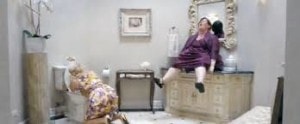As a little Halloween treat, we depart from the scary acts of discriminating and harassing employers. Instead, we turn to a little movie magic potty humor with an employment bent. (Click Picture or Link to Watch Clip).

In Austin Powers, when he is shoving serial killer Paddy O’Brien and his lucky charms head first into the toilet, Powers interrogates him by demanding to know: “Who does Number 2 work for?“ We have the answer! Under the Fair Labor Standards Act (“FLSA”) , and particularly 29 CFR § 785.18: “Rest periods of short duration, running from 5 minutes to about 20 minutes, are common in industry. They promote the efficiency of the employee and are customarily paid for as working time. They must be counted as hours worked.” So as long as the Number 2 does not take longer than 20 minutes – and regardless if the employee plays Angry Birds while taking care of business – Number 2 counts as hours work and must be paid by the employer.

National Lampoon’s Van Wilder gives a perfect example of what happens when bathroom access is improperly restricted. But, according this OSHA memorandum: “In light of the standard’s purpose of protecting employees from the hazards created when toilets are not available, it is clear that the standard requires employers to allow employees prompt access to sanitary facilities. Restrictions on access must be reasonable, and may not cause extended delays.” While an OSHA violation may not give an employee an individual right to sue, employers that retaliate for reporting the violation to OSHA, HR or management can be sued on a whistle blower retaliation claim.

OSHA also dictates the number of toilets that must be available for each gender based on the number of workers on site. So, for example of toilet counts in he work place, under 29 CFR § 1915.88, there has to be one toilet for up to 15 female employees, but five toilets for 81 to 110 women workers. Obviously, limiting the toilet usage for women would count as gender discrimination, but not men. As Bridesmaids so visually pointed out, sinks do not count in the tally of toilets for women.

We have previously blogged that employers must make reasonable accommodations to employees suffering from a disability under Title I of the Americans with Disabilities Act. There are bathroom related disabilities that employers must accommodate, such as irritable bowel syndrome or in the case of White Chicks, lactose intolerance. The failure to provide a disabled employee the simple accommodation of easy and regular access to the bathroom will give rise to a disability discrimination claim. This is supported by this OSHA memorandum, which provides that employer’s policy must “recognize[] individual medical needs, whether employees have reported adverse health effects, and the frequency with which employees are denied permission to use the toilet facilities. Knowledge of these factors is important not only to determine whether a citation will be issued, but also to decide how any violation will be characterized.”

Of course, a boss following a female employee into a bathroom, a la Maverick in Top Gun, and propositioning her for sex on the countertop would definitely amount to sexual harassment under Title VII of the Civil Rights Act of 1964 and R.C. § 4112.99. While most sexual harassers think they will get a “your friend was great” like Charlie’s response, it is really a “crash and burn” in the eyes of sexual harassment laws.
So while you are out trick-or-treating, keep an eye out for the evil employer. And if you see scary a spooky boss, who you gonna call? Call The Right Attorney to schedule a free and confidential consultation at 866-797-6040.
Spitz, The Employee’s Law Firm and its attorneys are experienced and dedicated to protecting employees’ rights and solving employment disputes.
Disclaimer:
The materials available at this employment law website are for informational purposes only and not for the purpose of providing legal advice. It would be best for to contact an Ohio attorney to obtain advice with respect to any particular employment law issue or problem. Use and access to this employment law website or any of the links contained within the site do not create an attorney-client relationship. The legal opinions expressed at or through this site are the opinions of the individual lawyer and may not reflect the opinions of Spitz, The Employee’s Law Firm, Brian Spitz, or any individual attorney.
